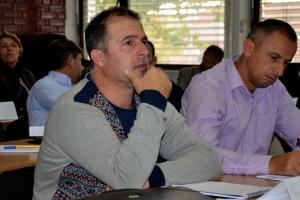OSCE Mission helps Kosovo emergency dispatchers improve their communication skills
“Hello, you’ve reached 112. What is your emergency?” is the phrase that accompanies Samedin Peci, 40, from Mitrovicë/Mitrovica throughout his work day. As a dispatcher for the Kosovo Agency for Emergency Management, he answers phone calls of people asking for help in emergency situations.
“My job is among the most stressful ones in the world, as we often deal with life or death situations,” he said. Yet Peci and other dispatchers of the Kosovo Agency for Emergency Management, Kosovo Police and First Medical Aid Unit were never trained in communications skills, which are crucial for this job.
To help remedy the situation, between March 2013 and October 2014, the OSCE Mission in Kosovo held a series of three training courses on communications in crisis situations for 250 emergency dispatchers throughout Kosovo.
The aim was to ensure a degree of uniformity in how emergency calls were handled and improve the quality of emergency response throughout Kosovo.
The emergency line 112 of the Agency for Emergency Management works 24/7. Depending on the location of the caller, the calls are directed to one of the five regions of Kosovo: Prishtinë/Priština, Pejë/Peć, Prizren, Gjilan/Gnjilane, and Mitrovicë/Mitrovica, which will arrange adequate help.
Training a uniform approach
According to Shpresa Mulliqi from the OSCE Mission in Kosovo, most of the dispatchers identified the same shortcoming in the way they managed the calls.
“At the beginning of the training they insisted that they should get the name and number of the caller first. But as the training progressed they all agreed that the most important thing is to get the exact address and the type of the emergency, and to get to know if there were injured people,” she said.
According to Mulliqi, the police dispatchers received some training specific to police work, while Emergency Management Agency dispatchers were trained on how to fill in the log book for example, but when it comes to communication skills, they basically worked on their intuition.
“It was good to see that during the training, the dispatchers actually developed and agreed to use a new form for logging all the calls, which now includes specific questions about specific type of emergencies and skip inquiries about unnecessary information. This all saves time and helps dispatch help as quickly as possible.”
The OSCE Mission in Kosovo provided three training courses to over 250 dispatchers in total. 120 were trained in March 2013, and another group of 100 in September 2014, on basic communications skills. A third group of over 30 dispatchers trained from 20 to 24 October 2014 on advanced communications skills during crisis situations will become future trainers
Benefits of the training
Peci said that the training helped him understand how to get as much accurate information as possible and that keeping calm is the key to good communication. “When someone calls yelling and screaming that their house is on fire, they want the firefighters at their house right now, but you need their address right now, too. So you need to stay calm yourself, calm the caller, get the information, and send help.”
Peci said that his Mitrovicë/Mitrovica unit receives an average of 300 to 400 calls in 24 hours, while 15 to 20 of them require follow-up, which includes contacting the proper agencies and sending them to the site to help the caller. They receive most calls of citizens reporting traffic accidents, sicknesses that require immediate treatment, and fires.
“The idea that the smallest mistake you may make can cost someone’s life is a heavy burden,” he said.
I remember a case when the third floor of a building was on fire, and the tenants of upper floors could not get out. They panicked, but they were not in danger. They needed someone telling them that help was coming and that they would be OK, so I kept talking to them until help arrived.”
- Samedin Peci, dispatcher at Kosovo Agency for Emergency Management
Difficult working conditions
Mulliqi said the dispatchers work in difficult conditions, mainly due to lack of trainings, space and adequate working equipment, making the job all the more difficult, so the trainings also tackled stress management. “These people often work in small offices, with no equipment but a phone, and they need to make the best out of it,” she said.
Miradije Berisha, dispatcher at a police station in Prishtinë/Priština, said her station deals with 30 to 40 cases a day. “I work alone in my shift, and I get calls reporting all kinds of crime, starting from the smallest to the most serious. It can be quite stressful, but the training helped me learn how to manage it,” she said.
Another major problem affecting their work is the prank calls. According to Peci, kids play with the phone sometimes and they call 112, which can be dialled when the phone is locked, or citizens call to get a number of an institution. “We treat all calls equally, because we don’t judge anything, but the prank calls take us a big amount of time.”

Future steps
As part of its mandate to strengthen security and public safety sector in Kosovo and deliver advanced and specialized training courses to law enforcement, the OSCE Mission will continue to help the dispatchers in the future.
Mulliqi said that the Mission will work with the dispatchers on drafting Standard Operating Procedures to serve as uniform instructions for them.
“The Procedures will need to be approved by the Ministry of Interior but once they have them, they would serve as clear guidelines as how to act in specific circumstances. With the future trainers among the dispatchers and clear guidelines, their work should become easier,” she concluded.


